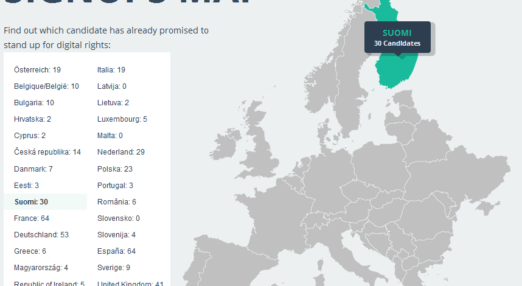Privacy
Filter by...
-

Denmark about to implement a nationwide ANPR system
The Danish police is planning to implement a nationwide automatic number plate recognition (ANPR) system over the next couple of years. The Danish newspaper Berlingske obtained the project description for the IT system through a Freedom of Information Act (FOIA) request, and reported about the ANPR plans. The ANPR system will consist of mobile units […]
Read more
-
Poland: Secret services escape citizens’ control
Poland celebrated its 25 years of democracy recently. In those two and a half decades, among other changes, most public institutions in Poland have got more or less used to citizens’ control. It has taken years of advocacy and watchdog activity, as well as a number of court cases to decide whether a given piece […]
Read more
-
We are not accusing the German minister of interior of lying
On 30 June 2014, Germany’s Minister of the Interior Thomas de Maizière announced an initiative to help move forward the proposal for a General Data Protection Regulation. EDRi applauds this “initiative”, which comes after Germany has worked assiduously to stop progress in the Council. According to internal Council documents obtained by the Spiegel in December […]
Read more
-
Romania: No communication without registration
Two bills initiated during the past month by the Romanian Government, with the direct and open support from the Romanian Secret Service (SRI), are attempting to kill any kind of electronic communication without prior identification and to expand dramatically the legal access to computer systems. The first bill aims to make the registration of all […]
Read more
-
Supreme Court of the US on cell phone searches: get a warrant
In the court case Riley vs California, the Supreme Court of the United States (SCOTUS) affirmed on 25 June what many digital rights activists have been telling a long time: Our mobile phones, especially smartphones, have become such an extension of ourselves that warrantless searches of them violate fundamental rights. Not only that, SCOTUS was […]
Read more
-
Belgian Big Brother Awards 2014: This year’s winners are…
On 4 June, EDRi member Liga voor Mensenrechten granted the Belgian Big Brother Awards. The public voted for the former public prosecutor Yves Liégeois for his views on DNA databases for newborn babies. The second prize, the professional jury’s prize, went to the “smartphone”, our ever-present pocket-size spy, and the third prize, the Lifetime Achievement […]
Read more
-
Report on Snowden – Government apathy but increased public concern
In the wake of the first anniversary of Edward Snowden’s first revelations, a global analysis was published, assessing the international impact of those disclosures. The report, “A crisis of Accountability” revealed not only that had most governments entirely ignored the Snowden revelations, but that some governments including the US and the UK have been actively […]
Read more
-
Facebook adds third-party website data to ad targeting profiles
Facebook announced in a blog post on 12 June 2014 that it will start expanding its users’ advertising data by letting marketers target ads based not only on users’ activities on the social network, but also on third-party websites. By clicking on an arrow in the corner of the ads, a user can see the […]
Read more
-

We promised to recruit digital rights-friendly MEPs – we delivered
WePromise.eu was an innovative campaign that sought to bring digital rights to the agenda of the European elections. It gathered wide support from throughout the political spectrum as well as from civil society and citizens, exceeding all expectations. With 434 candidates having signed up to the Charter of digital rights – including two top EU […]
Read more
-

WePromise: European Day of Action – 15 May 2014
Take back the net and take back EU politics! Civil rights organisations from across Europe invite you to participate in a day of action for the WePromise.eu campaign to demand that the next European Parliament defends digital civil and human rights. The European Parliament is taking more and more decisions that have a direct impact […]
Read more
-

We Promise campaign kit
The European elections will take place between 22 and 25 May – you can use this opportunity to tell candidates that they have to defend net neutrality, privacy, copyright reform, transparency and the access to culture in the next term. This campaign kit is therefore designed for everyone who wants to mobilise around the WePromise […]
Read more
-
Belgian Big Brother Awards 2014: The nominees
On 4 June 2014, the Belgian EDRi member Liga voor Mensenrechten will organize the 4th edition of the Big Brother Awards (BBA) in Belgium. The general public can decide on the person or organisation that will be “awarded” prizes for attacking citizens’ right to privacy. In the name of a greater “perception of security for […]
Read more
